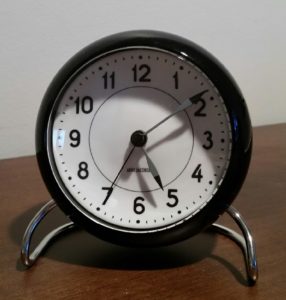 An easy-peasy way to lower your risk for type 2 diabetes may be to not eat late dinners. Research conducted in Spain found that eating a meal an hour before bedtime decreases insulin secretion, impairs and decreases glucose tolerance, and so increases type 2 diabetes risk.
An easy-peasy way to lower your risk for type 2 diabetes may be to not eat late dinners. Research conducted in Spain found that eating a meal an hour before bedtime decreases insulin secretion, impairs and decreases glucose tolerance, and so increases type 2 diabetes risk.
Lead author Marta Garaulet, PhD said: "We found that late eating disturbed blood sugar control in the whole group." The study had 845 participants, none with diabetes, all living in Spain. Melatonin levels (which rise naturally in the 2 hours before bedtime) were involved - so researchers say don't eat a meal then. Those with a certain gene variant had more disturbed blood sugar control than those without the gene.
Bottom line: Don't eat a meal in the 2 hours before bedtime.
From Medscape: Eating Dinner Late Ups Diabetes Risk; Melatonin Involved
Eating dinner close to bedtime when endogenous melatonin levels are high is associated with decreased insulin secretion and decreased glucose tolerance, which increase the risk of type 2 diabetes.
And people who are carriers of the G allele of the melatonin receptor-1b gene (MTNR1B) have greater impairment in glucose tolerance after eating a late dinner.
"In natural late eaters [in Spain], we simulated early and late dinner timing by administering a glucose drink and compared effects on blood sugar control over 2 hours," said senior author Richa Saxena, PhD, a principal investigator at the Center for Genomic Medicine at Massachusetts General Hospital, Boston.
The study also compared outcomes in carriers and noncarriers of the G allele variant of the melatonin receptor gene, Saxena pointed out, in a press release from the hospital.
"We found that late eating disturbed blood sugar control in the whole group," added lead author Marta Garaulet, PhD.
"This impaired glucose control was predominantly seen in genetic risk variant carriers, representing about half of the cohort," said Garaulet, professor of physiology and nutrition, University of Murcia, Spain.
The study results "may be important in the effort towards prevention of type 2 diabetes," according to co-senior author Frank A.J.L. Scheer, PhD.
"Our findings are applicable to about a third of the population in the industrialized world who consume food close to bedtime, as well as other populations who eat at night, including shift workers, or those experiencing jetlag or night-eating disorders, as well as those who routinely use melatonin supplements close to food intake," said Scheer, director of the Medical Chronobiology Program at Brigham and Women's Hospital, Boston, Massachusetts.
The results suggest people should not eat within 2 hours of bedtime, say the researchers.
Melatonin Plays a Key Role in Glucose Metabolism
Melatonin, a hormone primarily released at night that helps control the sleep–wake cycle, typically rises around 2 hours before bedtime, the researchers explain.
The discovery of MTNR1B as a type 2 diabetes-associated gene "suggests that beyond sleep and circadian regulation, melatonin plays a key role in glucose metabolism," they note.
However, whether melatonin improves or impairs glucose control is controversial, and the effect of MTNR1B genotypes on glucose control is not clear. "We decided to test if late eating that usually occurs with elevated melatonin levels results in disturbed blood sugar control," Saxena explained.
The average serum melatonin values were 3.5-fold higher after the late dinner than after the early dinner, resulting in 6.7% lower insulin area under the curve (AUC) and 8.3% higher glucose AUC. Genotype differences in glucose tolerance were attributed to reductions in beta-cell function. "Our results confirm that late eating acutely impairs glucose tolerance through a defect in insulin secretion," the researchers reiterate.
